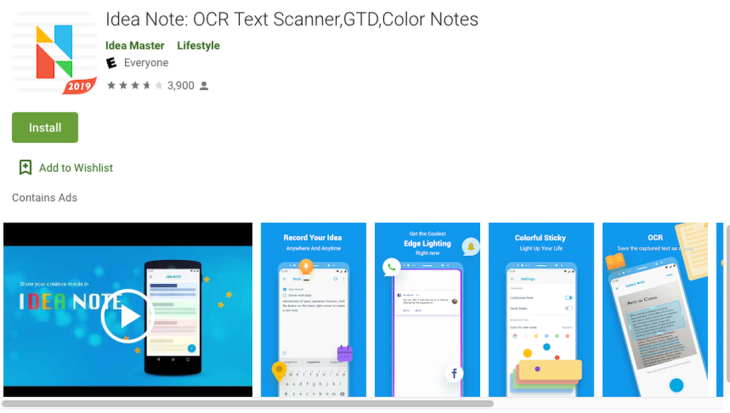These Android Apps Clicked On Ads Behind Users’ Back
Har Devarukhkar - Sep 07, 2019

These Android apps, which clicked on ads without users’ permission, had over 1.5 million users and stayed on the Google Play Store for nearly a year.
- Donald Trump's Ads Set To Invade YouTube Homepage In November
- Google Put A Ban On Political Ads Amidst Elections
- Here's How Tencents Embedded Ads Into Existing Movies And TV Shows
According to security researchers, there is a fitness and a notepad application installed more than one million times which have been clicking on advertisements secretly without users’ permission for almost a year.

These Android apps, which were developed by Idea Master, provided people with weight loss and life organizing tools. However, in fact, they were popping up advertisements off-screen then clicking on those ads several times in a day, according to a Thursday statement by Symantec cybersecurity researchers.
Idea Master did not immediately give any comment. Since the developer has been banned on Google Play Store – the platform for apps on Android devices, both two applications have been deleted.

These apps’ names were as in these images. As of August 23, the two apps were downloaded by over 1.5 million users.
Because of the open ecosystem of Android, Google has been struggling to keep adware as well as malware off the Play Store, especially in comparison with the App Store of Apple. Android lets you do more, but also expose you to more risks. The security program of Android has fixed problems with over one million applications in its Play Store over the last five years. Nevertheless, new attackers keep popping up with various ways to hide on users’ devices.

The advertisement fraud which took place on the apps of Idea Master was not noticed for a long time. The researchers said that the reason was its hidden code in Android packers which were typically used to protect intellectual property.
As soon as these apps are installed, they’ll show the advertisements outside the display view of the device and automatically click on the ads, which commits advertisement fraud and drains resources from the device. These advertisements take up the phone’s battery life as well as mobile data usage without the user recognizing it.
Before the advertisement fraud was discovered by the security researchers, some users downloading these applications noticed and expressed their concerns in the reviews section of these apps. There was a review from Aug 5th saying that the notes app was helpful, however, it had so many ads that the device was being slowed down.
Besides, the ads were called irritating and disruptive in another review and they were the ads which Android users saw.
>>> Healofy App By Indian Startup Is Back On Google Play Store
Featured Stories

Features - Jan 29, 2026
Permanently Deleting Your Instagram Account: A Complete Step-by-Step Tutorial

Features - Jul 01, 2025
What Are The Fastest Passenger Vehicles Ever Created?

Features - Jun 25, 2025
Japan Hydrogen Breakthrough: Scientists Crack the Clean Energy Code with...

ICT News - Jun 25, 2025
AI Intimidation Tactics: CEOs Turn Flawed Technology Into Employee Fear Machine

Review - Jun 25, 2025
Windows 11 Problems: Is Microsoft's "Best" OS Actually Getting Worse?

Features - Jun 22, 2025
Telegram Founder Pavel Durov Plans to Split $14 Billion Fortune Among 106 Children

ICT News - Jun 22, 2025
Neuralink Telepathy Chip Enables Quadriplegic Rob Greiner to Control Games with...

Features - Jun 21, 2025
This Over $100 Bottle Has Nothing But Fresh Air Inside

Features - Jun 18, 2025
Best Mobile VPN Apps for Gaming 2025: Complete Guide

Features - Jun 18, 2025
A Math Formula Tells Us How Long Everything Will Live
Read more

Mobile- Feb 12, 2026
What is the Most Powerful Gaming Phone Currently?
The Nubia Red Magic 11 Pro is the undisputed most powerful gaming phone right now, blending record-breaking benchmarks, unbeatable cooling, and gamer-centric design for peak performance that lasts.

Mobile- Feb 14, 2026
Android 17 Beta 1 Now Available for Pixel Devices
While Android 17 Beta 1 doesn't introduce flashy consumer-facing changes yet, it lays the groundwork for a more robust and flexible platform.

ICT News- Feb 13, 2026
Elon Musk Pivots: SpaceX Prioritizes Lunar Metropolis Over Martian Colony
While Mars enthusiasts may feel a temporary setback, the lunar focus could ultimately fortify humanity's multi-planetary future.
Comments
Sort by Newest | Popular